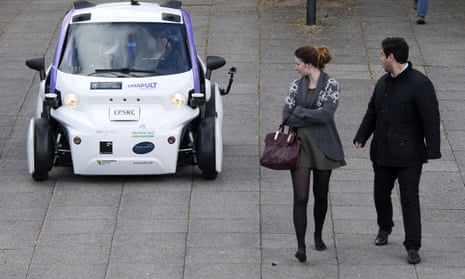A few years ago, I wrote a Guardian article about jetpacks.
A mode of transport that seemingly everyone wants and has been expecting (and angrily demanding of us scientists) for a good while, but which is still essentially nowhere in sight. I did my best to write about why jetpacks are not likely to be a household item any time soon.
Four years later, I find myself writing about a situation which is essentially the exact opposite. This time, the subject is self-driving cars, a mode of transport that we’re repeatedly told is just around the carefully manoeuvred corner. Indeed, the government is among the biggest advocates of driverless cars and has made some bold promises about their use. Yet Britain’s population is possibly the least enthused of all about fully automated vehicles and it seems the country is seriously unprepared for their widespread use.
These are the findings of a recent study, covered by The Times, into the state of play about autonomous vehicles in several countries. It seems that the British government talks a good game about self-driving cars, but our infrastructure is nowhere near ready for it and the public is the most sceptical.
Far be it from me to suggest that the government has a tendency to insist that something will be brilliant, and rapidly pushing ahead with it without doing any basic preparation, and despite the fact that most people don’t want it and may well be harmed by it, but this is one instance where the general public is almost surely in the right because most experts agree that this hype is exceedingly premature.
Many reasons to be sceptical about the imminent arrival of driverless cars are covered by Dr Hannah Fry in her book (and this article), and in this 2016 piece by Martin Robbins. But one constant theme with all concerns about self-driving cars is that most of the issues exist “beyond” the vehicle. Making a car that can move and control itself seems to be relatively straightforward, it’s the world around it that causes all the headaches.
For instance, in the study I referred to earlier, one of the main issues with Britain’s infrastructure for self-driving cars was poor mobile network coverage in many areas. How many people even realise that a self-driving car needs constant access to fast, reliable mobile data in order to communicate with other cars and traffic control?
It also conjures up other problems. Imagine a British self-driving car being used for a trip to mainland Europe? Stopping every 2 minutes so the passenger can repeatedly sign up to the free wifi at Spanish coffee shops, because the return of roaming charges post-Brexit mean you can’t afford to use the mobile networks.
Another big problem? Potholes! A classic feature of UK roads. The fact that the most cutting-edge tech can be brought literally crashing to a halt by an absence of asphalt is surely very telling. And what about insurance, that other vital aspect of modern car ownership? Who’s liable if your self-driving car hits another self-driving car? You, the car, the manufacturer? Car insurance is tricky and complex enough without opening this petrol can of worms. But it would be an unavoidable issue, with the current laws and rules of the road.
And of course, people are often the biggest issue. Even the most complex algorithm can’t hope to match the chaotic, unpredictable, baffling behaviour of the average human. Or “pedestrian”, as they’d be considered by autonomous vehicles.
This is another key aspect that is often overlooked in the upbeat coverage of self-driving cars. Even if the technology was perfect (which it isn’t, not even close), does that mean they’d automatically be trusted by the people who’d have to buy and use them to make them a viable prospect?
Definitely not. Humans trusting machines is a big ask at the best of times. Numerous studies have shown that even for something relatively mundane, such as helping with a basic recognition test, we are very reluctant to implicitly trust something entirely synthetic. That’s just not how we’ve evolved, we’ve evolved to trust other people with our own wellbeing and safety, not “tools” (the fact that other people are often less reliable than tools is another matter).
For instance, how many times have you been on hold on the phone, dealing with the automated system, before yelling “at last, a human!” when put through to someone in a call centre? True, the rise of the virtual assistants may be changing that, but it’s rare to surrender total control to such creations, particularly when your safety is a concern, as it would be in a car. Changing your music or setting your calendar is one thing, but who’s going to be the first person to say “Alexa, remove my appendix”?
Despite the good press self-driving cars are getting, all these issues and more still need to be dealt with. The British public has the right idea in being sceptical about them becoming a big part of our lives any day now.
